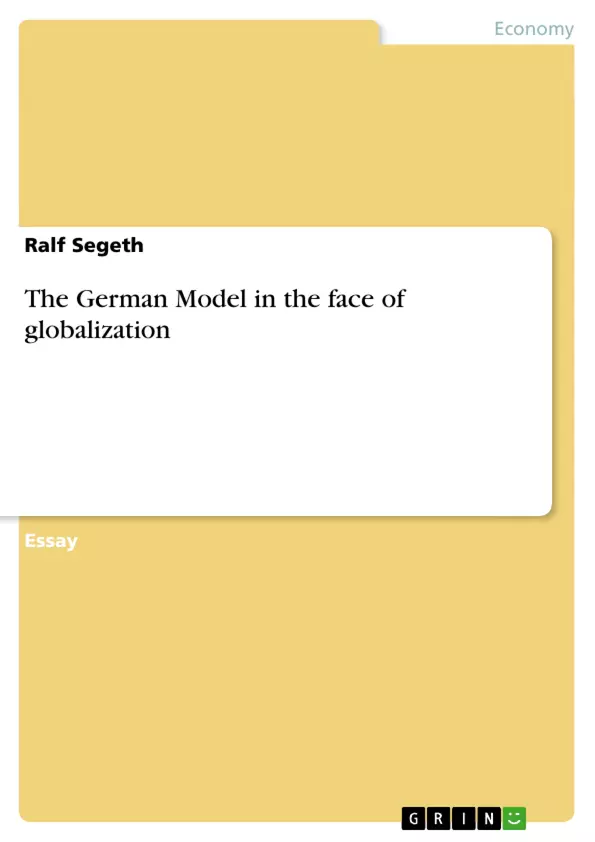The assumption that the developed economies are currently undergoing profound changes sparked by a technological ′revolution′ and fueled by broad liberalization in the international economy is no longer seriously debated. Where opinions diverge is on the effect this process, commonly referred to as globalization, has on the different models of capitalism. A widely held view is that of eventual convergence under the influence of similar pressures. Proponents of this perspective usually further argue that coordinated market economies (CMEs) will be the victims of this convergence as the model of capitalism fitter for survival is that of liberal market economies (LMEs).
This essay will argue, however, that the German system, as an example of a CME, will remain distinct from the US/UK model, as examples of LMEs, for the foreseeable future. This is indeed to a great extent due to what Soskice (1999) calls the "interlocking complementarities between the different parts of the institutional framework". But other factors, such as firms themselves exploiting institutional comparative advantages, institutions acting as shapers as well as takers of change, and explicit political choices also play a decisive role.
One of the main arguments of the varieties of capitalism-approach is that institutions matter, i.e. that both CMEs as well as LMEs have an institutional backup (Kitschelt et al. 1999). In the case of LMEs, most of these are found to be rather weak and some of them even non-existent. The main institution on which the model is based is thus the market, or rather the various markets for labour, products, corporate governance, capital etc. Information asymmetries between management on one side and owners, workers, unions, customers and competitors on the other are resolved through these respective markets. Little to no non-market coordination takes place (Hall and Soskice 2001).
CMEs, by contrast, are characterized by a whole array of institutions other than markets on which they rely for their functioning. Labor laws, for example, establish various co-determination mechanisms through which workers are involved in company matters, such as works councils and board membership. Moreover, employers are bound into employer associations and mandatory membership of chambers of commerce.
Inhaltsverzeichnis (Table of Contents)
- The German Model in the Face of Globalization
- Introduction
- Varieties of Capitalism and the German Model
- Liberal Market Economies (LMEs)
- Coordinated Market Economies (CMEs)
- Complementarities and the Role of Institutions
- The German Model and its Institutional Equilibrium
- Comparative Advantages and Sustainability of the German Model
- Challenges from Globalization and the Role of Politics
Zielsetzung und Themenschwerpunkte (Objectives and Key Themes)
This essay examines the future of the German model of capitalism in light of globalization. It argues that despite the pressures of globalization, the German system will remain distinct from the US/UK model due to its unique institutional framework. The essay explores the interplay of institutions, complementarities, and comparative advantages in shaping the German model.
- The distinct nature of the German model of capitalism in comparison to US/UK models.
- The role of institutions, both individually and collectively, in shaping capitalist models.
- The concept of institutional complementarities and their impact on system stability.
- The comparative advantages of the German model and its ability to adapt to globalization.
- The influence of politics and social choices in shaping economic systems.
Zusammenfassung der Kapitel (Chapter Summaries)
- Introduction: This section introduces the topic of globalization and its impact on different models of capitalism, particularly the German model.
- Varieties of Capitalism and the German Model: This chapter outlines the main features of two distinct capitalist models: Liberal Market Economies (LMEs) and Coordinated Market Economies (CMEs). The German model is presented as an example of a CME, highlighting its key institutional features.
- Complementarities and the Role of Institutions: This chapter discusses the importance of institutional complementarities in sustaining capitalist systems. It argues that institutions do not exist in isolation but depend on each other for their effective functioning.
- The German Model and its Institutional Equilibrium: This chapter focuses on the specific institutional features of the German model, emphasizing its reliance on non-market coordination mechanisms and the interdependency of its various elements.
- Comparative Advantages and Sustainability of the German Model: This chapter analyzes the comparative advantages of the German model, highlighting its quality-based competitive strategy and its reliance on highly skilled workers and long-term finance. It also discusses the self-reinforcing tendencies of the system.
Schlüsselwörter (Keywords)
The main keywords and focus topics of the text include: globalization, varieties of capitalism, coordinated market economies, liberal market economies, institutional complementarities, comparative advantage, German model, institutional equilibrium, political choices, and economic systems.
Frequently Asked Questions
What is the "German Model" of capitalism?
The German model is a Coordinated Market Economy (CME), characterized by non-market coordination, strong labor laws, co-determination, and interlocking institutional complementarities.
How does globalization affect the German economic system?
While some argue globalization leads to convergence towards Liberal Market Economies (LMEs), this essay suggests the German model remains distinct by exploiting institutional comparative advantages and political choices.
What are "institutional complementarities"?
These are interlocking parts of an institutional framework (like labor relations and corporate governance) that strengthen each other, making the overall system more stable and resistant to external pressures.
What is the difference between CME and LME?
LMEs (like the US/UK) rely on market mechanisms and competition to resolve information asymmetries. CMEs (like Germany) rely on strategic interaction and institutions like unions and employer associations.
Why is the German model sustainable in a globalized world?
Sustainability comes from high-quality production strategies, a highly skilled workforce, and long-term financing, which provide a competitive edge that simple low-cost market models cannot easily replicate.
- Citation du texte
- Ralf Segeth (Auteur), 2002, The German Model in the face of globalization, Munich, GRIN Verlag, https://www.grin.com/document/8771



